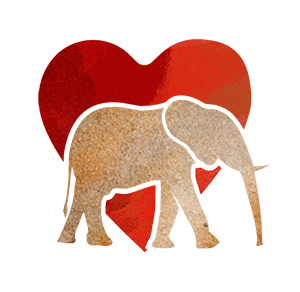On 1st July 2016, Angela Sheldrick received a phone call from Richard Bonham of Big Life regarding an orphaned elephant who had been reported by the community of the Rombo Group Ranch, abutting the Tsavo West National Park and close to the Tanzanian border. It was awhile before the Big Life scouts could reach the location where the calf was last sighted to confirm the situation, and due to the dense bush and lack of roads, they were unable to locate the baby again that day. The rescue was postponed until the next morning, when, thankfully, the little bull appeared again and the Big Life Scouts were able to rescue him.
He was well under a year old, and had actually been sighted by community members for three days prior to being retrieved, so was in a very emaciated state. Given his weakness he was easily overpowered and captured, and lifted into the back of a Land cruiser to be driven to the Amboseli National park airstrip, a journey which took approximately 1 ½ hours, where the DSWT rescue team from Nairobi were by now already in situ. Once at the airstrip the Nursery Keepers were able to give this thirsty little boy some much need re-hydration, along with milk, before preparing him for the flight by placing him recumbent on a comfortable mattress, which lay on top of the canvas rescue stretcher. Given his dehydrated state, he was immediately placed on IV fluids for the duration of the flight which, from Amboseli to Nairobi lasted about forty five minutes, so it was not too long before he was safely at the Nairobi Nursery where we estimated him to be approximately between 8 and 9 months old.
![]()
![]()
He was placed in a stockade filled with an abundant variety of carefully chosen soft green vegetation tied in bunches around his enclosure, and he immediately began to feed on these.
We named him Pare, after the Pare Mountains that shadow Lake Jipe at the southern end of Tsavo West. When orphan Pare arrived at the Nursery, he behaved as if he had been here all his life, seemingly delighted and relieved to have food, company, and plenty of love and comfort. Amazingly he was totally affectionate from the outset, suckling the Keepers’ fingers and wrapping his trunk around their necks. Pare never needed taming down - which sometimes is not a good sign, and sure enough the next day he collapsed, as is so often the case with these starvation victims. However, thanks to swift action and IV fluids, we managed to get him back onto his feet, and most importantly, feeding once more. Very soon he joined our baby herd out in the Nairobi Park forest, but as the weeks past his condition worsened, and it became clear he was riddled in parasites, not surprising having come from a region heavily impacted by Masai livestock. More and more we are seeing the impact of livestock on the elephant populations as they share the same areas and watering points. Very often the parasites can prove life threatening for the elephants. Pare's condition remained precarious for a long time, whilst we worked extremely hard to find solutions. During this time he was moved into the comfort of a stable at night-time since he became too weak to get back onto his feet after sleeping and always needed the help of a Keeper, who remained with him twenty four hours a day.
Thankfully, just when we were beginning to fear the worst, Pare began to rally and has become stronger and more confident. However, he has become fearful of lying down to sleep and instead chooses to sleep standing leaning against the wooden stable walls. We believe that this is a result of being so weak for so long and always requiring assistance from his attentive Keepers. Nevertheless, despite help always being at hand, it was obviously a frightening feeling for him; despite being able to get back up unaided after wallowing escapades in the mud bath and soil piles, the habit remains. In the fullness of time we are confident that he will outgrow his phobia, as we watch his condition improve daily.
Pare is an extremely gentle little bull, affectionate and loving, whose rescue came not a moment too soon.































